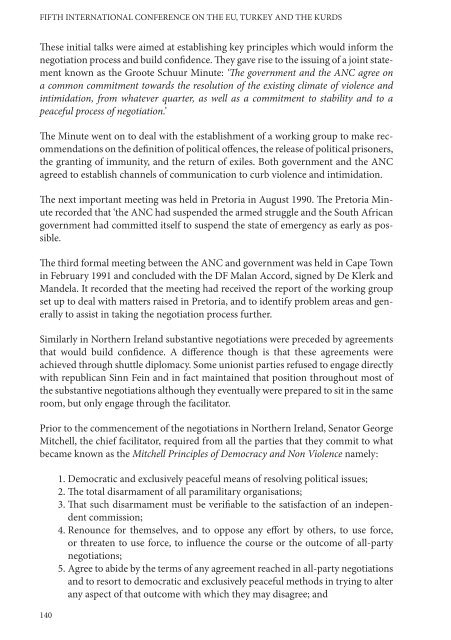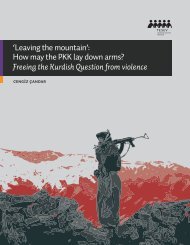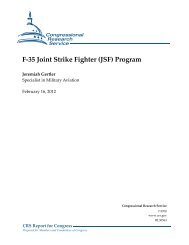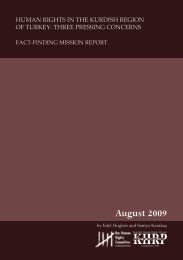FIFTH INTERNATIONAL CONFERENCE ON THE EU TURKEY AND THE KURDS
fifth international conference on the eu, turkey and the kurds
fifth international conference on the eu, turkey and the kurds
Create successful ePaper yourself
Turn your PDF publications into a flip-book with our unique Google optimized e-Paper software.
<strong>FIFTH</strong> <strong>INTERNATI<strong>ON</strong>AL</strong> <strong>C<strong>ON</strong>FERENCE</strong> <strong>ON</strong> <strong>THE</strong> <strong>EU</strong>, <strong>TURKEY</strong> <strong>AND</strong> <strong>THE</strong> <strong>KURDS</strong><br />
These initial talks were aimed at establishing key principles which would inform the<br />
negotiation process and build confidence. They gave rise to the issuing of a joint statement<br />
known as the Groote Schuur Minute: ‘The government and the ANC agree on<br />
a common commitment towards the resolution of the existing climate of violence and<br />
intimidation, from whatever quarter, as well as a commitment to stability and to a<br />
peaceful process of negotiation.’<br />
The Minute went on to deal with the establishment of a working group to make recommendations<br />
on the definition of political offences, the release of political prisoners,<br />
the granting of immunity, and the return of exiles. Both government and the ANC<br />
agreed to establish channels of communication to curb violence and intimidation.<br />
The next important meeting was held in Pretoria in August 1990. The Pretoria Minute<br />
recorded that ‘the ANC had suspended the armed struggle and the South African<br />
government had committed itself to suspend the state of emergency as early as possible.<br />
The third formal meeting between the ANC and government was held in Cape Town<br />
in February 1991 and concluded with the DF Malan Accord, signed by De Klerk and<br />
Mandela. It recorded that the meeting had received the report of the working group<br />
set up to deal with matters raised in Pretoria, and to identify problem areas and generally<br />
to assist in taking the negotiation process further.<br />
Similarly in Northern Ireland substantive negotiations were preceded by agreements<br />
that would build confidence. A difference though is that these agreements were<br />
achieved through shuttle diplomacy. Some unionist parties refused to engage directly<br />
with republican Sinn Fein and in fact maintained that position throughout most of<br />
the substantive negotiations although they eventually were prepared to sit in the same<br />
room, but only engage through the facilitator.<br />
Prior to the commencement of the negotiations in Northern Ireland, Senator George<br />
Mitchell, the chief facilitator, required from all the parties that they commit to what<br />
became known as the Mitchell Principles of Democracy and Non Violence namely:<br />
140<br />
1. Democratic and exclusively peaceful means of resolving political issues;<br />
2. The total disarmament of all paramilitary organisations;<br />
3. That such disarmament must be verifiable to the satisfaction of an independent<br />
commission;<br />
4. Renounce for themselves, and to oppose any effort by others, to use force,<br />
or threaten to use force, to influence the course or the outcome of all-party<br />
negotiations;<br />
5. Agree to abide by the terms of any agreement reached in all-party negotiations<br />
and to resort to democratic and exclusively peaceful methods in trying to alter<br />
any aspect of that outcome with which they may disagree; and





